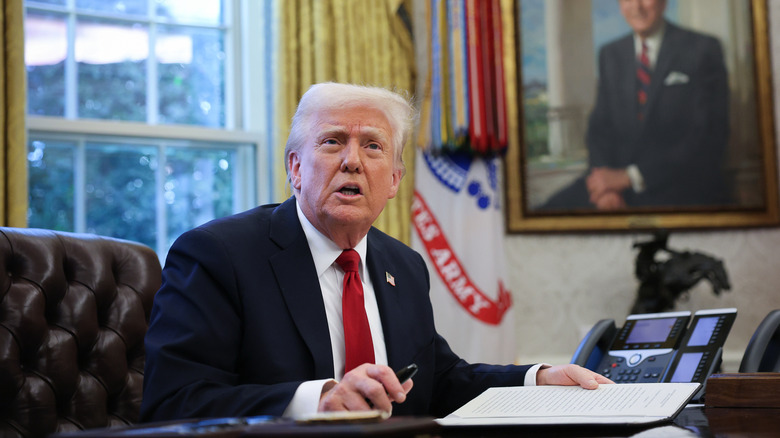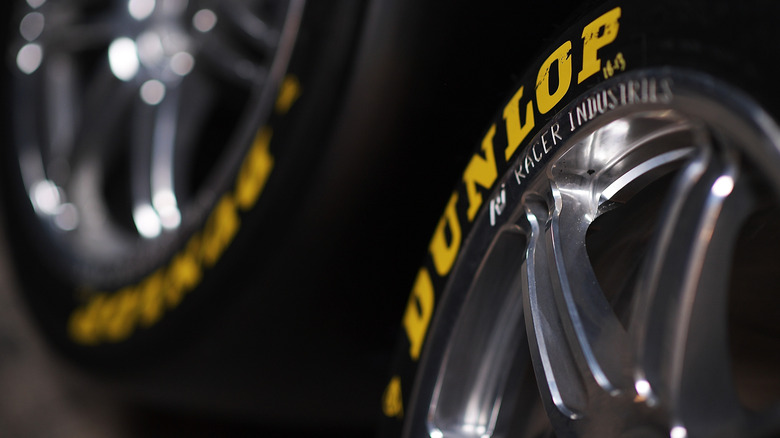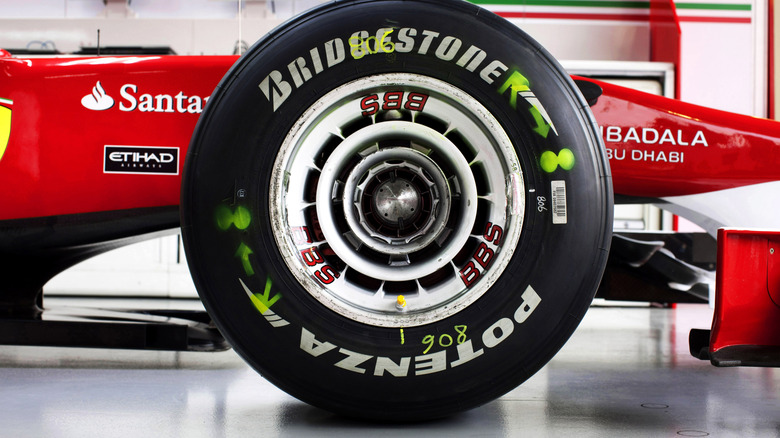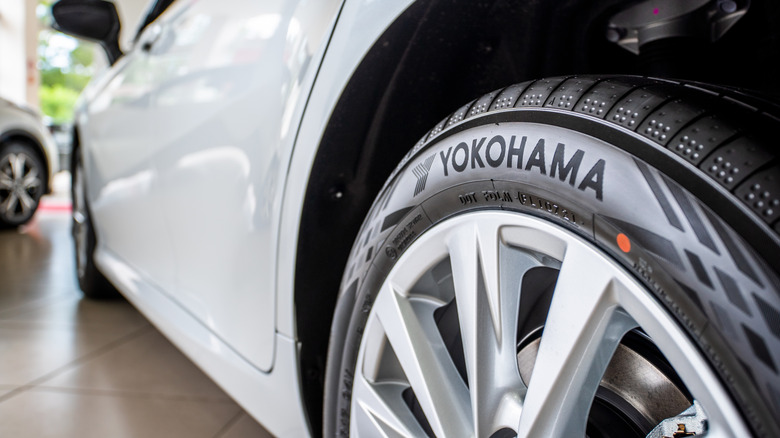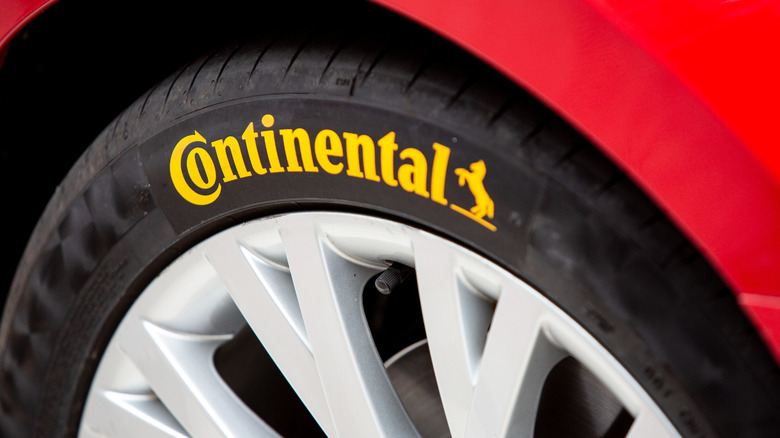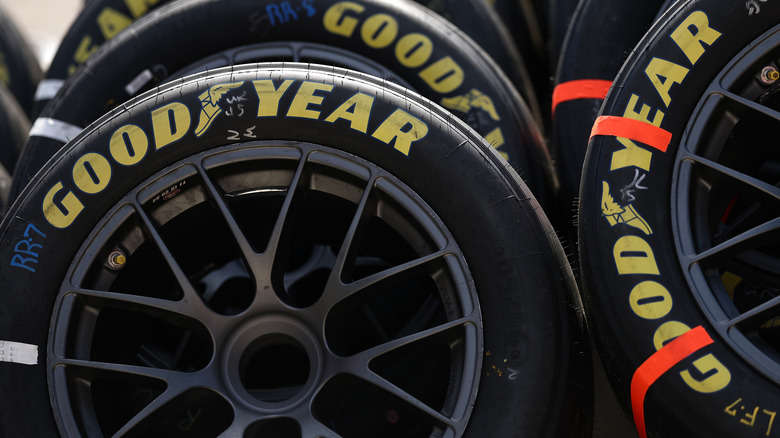5 Tire Brands That May Be The Most Impacted By American Tariffs
When President Trump announced his 25% tariff on foreign auto parts, the tire industry felt a lot of pressure. According to a JPMorgan report, 63.4% of the tires sold in the U.S. in 2024 were imported, totaling roughly $18.7 billion and making tires the nation's 28th most imported good. And while Canada and Mexico, two of the country's largest trade partners and signees to the USMCA free trade agreement, play significant roles, several East Asian nations targeted by the tariffs form a major contingent of the industry's imports. In 2024 alone, Thailand, Japan, and Vietnam collectively accounted for $6.45 billion of tire exports to the United States. This number doesn't include natural rubber exports — a key distinction, since over 90% of the country's natural rubber supply derives from the region, according to the U.S. Tire Manufacturers Association.
Despite the administration's efforts to clarify the new tariff regime, including exemptions for auto parts compliant with the 2020 U.S.-Mexico-Canada trade agreement, experts are still uncertain about the tire industry's long-term outlook. Responding to this trepidation, the president signed another executive order in late April 2025, providing relief from other tariffs and tax credits applicable to the value of imported auto parts. According to the administration, the order gives manufacturers more time to adjust supply chains. But some industry members caution that the latest measures do little to protect U.S. manufacturers from the post-tariff price increases of auto parts. As a whole, consumer car prices are predicted to rise, with S&P Global predicting a 5-10% increase in 2025 alone. According to the Center for Automotive Research, tariffs could cost U.S. manufacturers up to $107.7 billion.
Sumitomo
One of the first manufacturers to announce price increases was the Japanese tire manufacturer Sumitomo. Known by many consumers as Toyota's tire supplier, the company is the world's fifth-largest tire maker, offering budget tires with high mileage options. In addition to the company's flagship Sumitomo Tires brand, it also owns Falken Tires and Dunlop, which it bought from Goodyear in January 2025 for a whopping $701 million.
Producing over 124 million tires annually across twelve manufacturing plants located in Japan, China, Thailand, Indonesia, Brazil, Turkey, and South Africa, the Japanese manufacturer is expecting to feel the full brunt of the new tariffs. Ironically, the tariffs come just a few months after Sumitomo closed its only U.S.-based factory in Tonawanda, New York, that employed 1,550 workers. While the company's managing director stated during its 2024 tri-quarter report that they will "eventually" reopen North American production, a company spokesperson told Bloomberg News that it wouldn't be possible until at least 2030.
According to the tire manufacturer, price increases will begin in May 2025 and reach up to 25%. The Trump administration's tariffs are particularly cumbersome for a company like Sumitomo, which mostly sources its U.S.-sold tires from Thailand. The upcharge in pricing comes as the Japanese company saw significant gains in the North American market, with regional sales increasing by nearly 10% to the tune of $1.64 billion. Whether price increases cut into the company's growing success remains to be seen.
Bridgestone
Bridgestone could see the biggest hit of any major tire brand. The second-largest tire supplier to the U.S. market in 2024, the United States constitutes roughly 40% of Bridgestone's yearly revenue. The company, which possesses a U.S. manufacturing base but sources much of its tires from Thailand, projected its raw rubber supplies to increase in price during its 2025 outlook, citing tariffs as a contributing factor.
Pessimism surrounded Bridgestone following the administration's tariffs, with its stock dropping 4% upon their announcement. The regulation came shortly after Bridgestone closed one of its longest-standing American plants in LaVergne, Tennessee. According to the manufacturer, the move was part of a larger effort to centralize its tire production in 16 factories across the United States — still only a fraction of its larger 72 tire plants worldwide. And while Bridgestone will likely rely on its U.S. factories more following the announcement, increases in steel and natural rubber costs could also prove detrimental to the manufacturer's American business, particularly as tariffs on Canada and Mexico hamper its supply chain's cost reduction efforts.
Even before the new tariffs, Bridgestone faced a 48.39% antidumping tariff levied by the Department of Commerce in October 2024 to counteract artificially low prices. For reference, U.S. International Trade Commission data lists the average cost of a Thai-imported tire as $38, roughly a fifth of the price for the same product imported in France. Whether this type of punitive rate interacts with the new auto parts tariff in the same way as its steel counterpart, in which companies only pay the higher of the two rates, remains unclear.
Yokohama
Another Japanese manufacturer, Yokohama Rubber Co., announced it would increase tire prices by 10% in May 2025. According to the company's COO, Stan Changdie, the move comes after an "unparalleled rise in costs associated with materials and finished goods."
The world's eighth-largest tire manufacturer, Yokohama supplies its three signature tires — AVID, ADVAN, and GEOLANDER — to a variety of global car manufacturers, including Porsche, Audi, BMW, Dodge, Fiat, Honda, Mercedes-Benz, Mitsubishi, and Toyota, among others. One of the company's subsidiaries, Yokohama TWS, produces Mitas and Trelleborg brand tires for off-highway agricultural, construction, and material handling vehicles.
The price increase comes on the tail of record profits in 2024, in which the manufacturer hit a whopping $6.22 billion in tire sales. It also shows the strain that tariffs and rising material costs are placing on Yokohama, despite its expanding North American manufacturing base. Since 2013, Yokohama has steadily increased its U.S. investments beyond its consumer tire factory in Virginia, opening a medium truck tire plant in Mississippi and off-highway facilities in Iowa and South Carolina. The Hiratsuka-based manufacturer also broke ground in 2024 on a $380 million factory in Saltillo, Mexico, to further expand its North American consumer tire production, hoping to add five million tires per year to the market by 2027. Despite this significant North American presence, reciprocal tariffs are forcing the company to adapt its pricing to an increasingly expensive supply chain.
Continental
Continental AG is one manufacturer that has been upfront about where its tariff costs will land: the consumer. In an interview with Bloomberg, Continental's CFO, Olaf Schick, said, "For us it's clear: We cannot bear additional duties, and we are informing our customers about that."
Based out of Germany, the U.S. market constituted a fifth of the manufacturer's sales in 2024. And although the company operates three U.S. tire plants, investing $1.5 billion in its U.S. manufacturing base since 2010, much of this demand is serviced by 22 factories in Mexico. The effect of new tariffs on Mexico-produced tires is somewhat opaque. Under the new tariff regime, auto parts compliant with the United States-Mexico-Canada trade agreement are exempt from the 25% tariffs. To be eligible for this exemption, however, the regional value content, or the percentage of the labor and materials that went into manufacturing the tire must be north of 70% – a difficult bar to clear in an industry that sources most of its components internationally. Wage requirements also make it difficult for many Mexican-produced products to obtain a waiver under the trade agreement.
Continental's tire manufacturing guide provides insight into how the complexity of the tire manufacturing process makes it difficult for companies with a strong North American manufacturing base to clear the trade agreement's regional value content rules. According to the company, Continental's tires are made of 25 components made of 12 different rubbers, textiles like nylon, polyester, and rayon, and high steel. Because manufacturers often source these materials from East Asian countries like Indonesia, India, Vietnam, and China, assembling them in North America isn't a guarantee of tariff exemption. Furthermore, it makes the tire industry highly susceptible to the raw-material price increases caused by tariffs.
Goodyear
Even companies expected to benefit from tariffs may experience difficulties in the coming months. One such company is Goodyear, whose stock price rose by 12% after the initial announcement. Much of this endorsement comes from an expected rise in replacement tire sales spurred by consumers turning away from the Akron, Ohio, company's tariff-laden competitors. So why did Goodyear announce that its prices will rise in 2025? As it turns out, tariffs may not be a major coup for America's largest tire manufacturer after all.
For one thing, Goodyear doesn't solely depend on its U.S. factories to supply its global tire production. Of the company's 53 manufacturing locations, 19 are outside the United States. Both Canada and Mexico are key cogs in the company's production structure. To further complicate the matter, Goodyear's global supply chain includes countries targeted by the new tariffs. This isn't unique in an industry whose biggest material suppliers are Thailand, Indonesia, Vietnam, India, and China. According to a spokesperson, the company expects its raw material costs to skyrocket by $350 million during the first six months of 2025 alone. In response to these changes, Goodyear announced in April 2025 that prices will rise across its product line, up to 4% in the United States and 6% in Canada.
